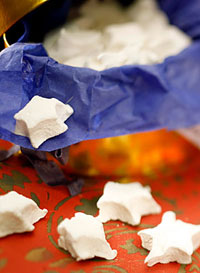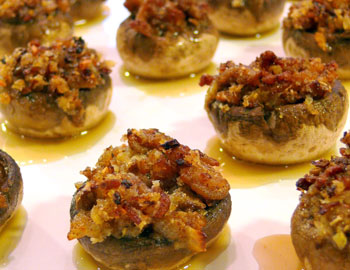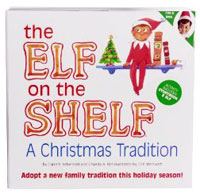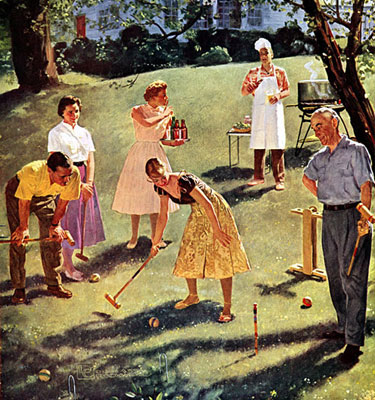From the L.A. Times
 Considering everybody on your holiday gift list – friends, family,
co-workers, neighbors, your kids' teachers – you might be needing a
stimulus package before you even get to the big-ticket items this year.
So why not take a page from your grandmother's playbook and make the
smaller gifts yourself?
Considering everybody on your holiday gift list – friends, family,
co-workers, neighbors, your kids' teachers – you might be needing a
stimulus package before you even get to the big-ticket items this year.
So why not take a page from your grandmother's playbook and make the
smaller gifts yourself?
Not only are homemade gifts less expensive, they also capture the
spirit of holiday giving in a way that purchased gifts simply can't.
And if you consider the ubiquitous traffic and holiday crowds, a
leisurely morning spent baking breadsticks or whipping up a batch of
homemade marshmallows seems positively Zen-like by comparison.

 Memories of holiday celebrations remain very food centric for me. When I recall the roasts, turkeys and hams of holidays past, I am instantly transported to the chaos and love of the kitchens where those meals were affectionately prepared.
Memories of holiday celebrations remain very food centric for me. When I recall the roasts, turkeys and hams of holidays past, I am instantly transported to the chaos and love of the kitchens where those meals were affectionately prepared. It’s become fashionable to say that your favorite holiday is Thanksgiving, and every so often I say those words. What I mean is that Thanksgiving is a holiday that’s entirely about food. The glorious turkey. The stuffing your mother used to make. And pies, pies, pies. When you say your favorite holiday is Thanksgiving, you’re not just praising Thanksgiving – you’re secretly dissing Christmas, with all its mercenary trappings and its promise of day-after holiday depression.
It’s become fashionable to say that your favorite holiday is Thanksgiving, and every so often I say those words. What I mean is that Thanksgiving is a holiday that’s entirely about food. The glorious turkey. The stuffing your mother used to make. And pies, pies, pies. When you say your favorite holiday is Thanksgiving, you’re not just praising Thanksgiving – you’re secretly dissing Christmas, with all its mercenary trappings and its promise of day-after holiday depression. I was the youngest of five boys, most of them out on their own by the time I have any real Christmas memories. Being the baby of the family, and 8-years-younger than my closest brother, I had a different relationship with my dad than they did. He was an old-fashioned father and my arrival had been quite a surprise (they were hoping for a girl.) My mother passed away when I was five-years-old and my dad was forced to raise my brother Paul and me by himself for a few years before he remarried.
I was the youngest of five boys, most of them out on their own by the time I have any real Christmas memories. Being the baby of the family, and 8-years-younger than my closest brother, I had a different relationship with my dad than they did. He was an old-fashioned father and my arrival had been quite a surprise (they were hoping for a girl.) My mother passed away when I was five-years-old and my dad was forced to raise my brother Paul and me by himself for a few years before he remarried. It’s the holiday season and along with sipping cocoa by the fire, it’s the perfect time to cozy up with a good book. We thought we’d take the time to share some classic titles for your twelve days of Christmas. Maybe we’ll introduce you to a new title or two.
It’s the holiday season and along with sipping cocoa by the fire, it’s the perfect time to cozy up with a good book. We thought we’d take the time to share some classic titles for your twelve days of Christmas. Maybe we’ll introduce you to a new title or two.


